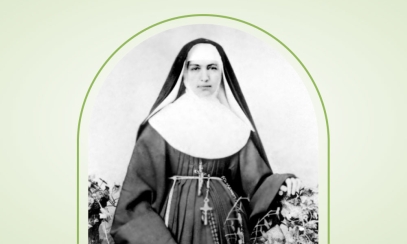
The Cheerful Givers
Sts. Louis and Zélie Martin, the parents of St. Thérèse of Lisieux, are known for their shared commitment to charity and justice, as well for the lives of holiness they led—and shared—with their family and community. Today, they remain a model of generosity for all of us.
Sts. Louis and Zélie Martin, the parents of St. Thérèse of Lisieux, are known for their shared commitment to charity and justice, as well for the lives of holiness they led—and shared—with their family and community. Today, they remain a model of generosity for all of us.
“Give, always give and make people happy,” Louis Martin once wrote to his daughter Marie. It’s a lesson he and his wife lived daily.
Both Louis and Zélie wanted to pursue religious life, but both were rejected by the communities they chose. Louis was unable to learn Latin at the level necessary to join the Canons Regular of the Hospitaller Congregation of Great Saint Bernard, and Zélie was too unhealthy to join the Daughters of Charity at the Alençon hospital.
The pair, who had not yet met, decided to do their best in the face of this rejection. Louis began working as a watchmaker, and Zélie started her own lace making business.
But the disappointment stung. Years later, Zélie still wrote about the grief she felt at not being able to pursue her dream. She and her husband each felt like they had failed in their duty to God and to the world around them.
As we know today, God had other plans. Louis and Zélie were crossing the Saint-Léonard Bridge when they encountered one another for the first time. As their eyes met, Zélie heard the words, “That is he whom I have prepared for you.”
Three months later, the couple were wed in a midnight ceremony lit with candles. Even as they spoke their vows, however, Louis and Zélie were committed to their shared agreement that they would remain celibate and contemplative in their union, living as brother and sister rather than husband and wife. Theirs would be a “Josephite” marriage, one that would perfectly imitate the Holy Family.
It was a decision their confessor convinced them to reverse after just 10 months. Perfectly balanced in temperament and bonded by love, the Martins ultimately had nine children together. Four died quite young, and the remaining five decided to enter religious life.
In 1877, Zélie died of malignant breast cancer. She was only 46. Louis cared for her tenderly and mourned her deeply, ultimately moving to Lisieux so he and his girls could be closer to family.
Louis’ remaining years were marked by ill health and suffering. He viewed all these cares as ways of becoming holier and, indeed, brought many of his fellow sufferers closer to God along the way. He died in 1894 at the age of 71.
The Martins were canonized by Pope Francis in 2015, and there are many impressive stories about Louis and Zélie and their lives of service and devotion.
But there is one tiny detail—an artifact of these two remarkable individuals, and of the home they made together—that is not to be overlooked.
In the Martins’ Alençon home, there is a step, one you might easily walk over without a second glance. It’s one of three located between the Martins’ bedroom and the chapel. Engraved upon it are the words Charity and Justice.
These are big ideas, upon which Louis and Zélie looked and trod each day. These concepts formed the literal and figurative foundations of their family life together and are still urgently needed in our more modern, secular world.
After all, charity and justice are the first steps toward sainthood.



